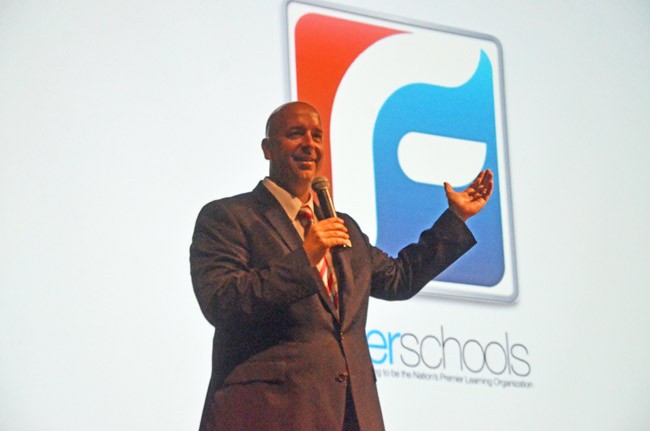
The tech industry developed the technique almost to an art form: the product kick-off. The best kind mix anticipation and excitement with the charisma of the presenter, not to mention a worthy product, launching iPhones and Xboxes to stratospheric popularity.
In Flagler County, Superintendent Jacob Oliva has adapted the product roll-out to Flagler County schools. The product this morning was the 2015-16 school year and its own branding—“teaching that engages, a culture that embraces, a technology that empowers”—which Oliva launched in a 45-minute presentation before a packed Flagler Auditorium: almost every one of the district’s 1,000 teacher and administrator was there (and even that was only 60 percent of the workforce of the county’s largest employer).
It wasn’t a simple welcome back. That could have been taken care of with the breakfast just before the welcome and the usual bromides about what a wonderful district this is and what a great year it’ll be. But that’s not quite Oliva’s style. One of his points today was the opposite: that praise for its own sake is lethal to learning. It numbs rather than fosters intelligence. He was not about to start the year with undue praise, though he spoke at length of the district’s achievements last year and its many ongoing attempts to break the molds of traditional education.
That’s been Oliva’s story: to reconstruct the way parents and teachers understand what it means for students to go to school every day, getting long distances away from the old habit of days in school listening to a teacher and following directions, and embracing a new mode of learning that shifts much of the work onto students themselves, making them, in part, their own teachers. But for that to work, they must have direction and some idea of where they themselves want to go.
The focus was Oliva’s signature initiative as superintendent over the past two years: bridging what students are learning in school with what they’ll want to do, or will be expected to do, in the workforce—even as the jobs they’ll be filling a dozen years from now don’t yet exist. The district’s challenge is to create a mindset that prepares students regardless, what Oliva called a “growth mindset” that assumes any child can be and do anything as long as there’s encouragement and opportunity, as opposed to a “fixed mindset” that assumes a child is locked into a pre-destined track. Girls are especially condemned to such tracks when their parents or teachers assume, for example, that they’re less inclined to go into the sciences than boys are, when research shows the opposite tends to be the case.
“We’re preparing students for jobs that don’t yet exist, for a workforce that we don’t know what it is, to solve problems that we don’t know what they involve yet,” Oliva said, after listing 10 jobs today that didn’t exist a decade ago—among them chief listening officers, social media managers, app developers, millennial generational experts, and market research data miners.
He’d also just flashed a slide on the auditorium’s big screen that showed the evolution of the top five influences on students over the decades. In the 1950s, the top-most influence was the home, followed by school, church, peers and television. These days, television is at the top, along with “media,” that interacting with social media, the internet and other screens that have so vastly expanded the demands on children’s eyes and ears. Peers and church are in second and third place, relegating school and home to fourth and fifth.
“We start asking ourselves about the type of children that we serve, we need to also understand the influences that they have, coming into our classrooms, because we can’t make assumptions,” Oliva said. “A lot of times we make assumptions that kids have strong core home values and should know certain things about being po9lite, about sharing, about working together. We can’t assume that these children have that background. So those things can be taught.”
If it weren’t for the setting or the audience, Oliva’s presentation could have been mistaken for the vision for economic development in Flagler County–a vision more lucid and concrete than any heard at innumerable county and city forums that claim devotion to economic development.
Halfway through his talk Oliva went into his three themes for the year– “teaching that engages, a culture that embraces, a technology that empowers,” ideas he returned to like a refrain in the year’s main song. The words sounded like slogans at first, peppy but vague. He soon fleshed them out. “If we incorporate these three things in everything we do across our entire school district,” Oliva said, “then we’re doing what we need to do to reach our vision of making sure that every student—it doesn’t say most students, it doesn’t say some students, it says all students—are successful for college and careers.”
He outlined what started last year as the flagship programs in every school—the VyStar bank at Matanzas High School, the Flagler Schools Observer providing hands-on journalism experience to students at Flagler Palm Coast High School, the medical program at Rymfire Elementary, the engineering academy about to open at Wadsworth Elementary, and so on. Each of those programs is intended to prepare students for jobs in the region and to reduce the reality that has long defined Flagler County: that Flagler Palm Coast High School is the county’s best export industry. Its students go off to work elsewhere, never to return.
Oliva wants students to have a more solid direction. He wants high school freshmen to know where they’ll be in four years. “It’s our obligation to make sure that all students are prepared to be successful in those industries,” he said. But the school system must engage all students in the process along the way. “I’m a former high school principal, and I’ll tell you, one of the number one things that frustrated me the most is when I’d meet with freshmen walking through the doors that’s going to happen in this very school and at Matanzas next Monday, that don’t know nowhere they want to be in four years. Because I’m here to tell you, if you’ve got as freshman that’s walking in the school and they don’t know where they want to be in four years, we’ve lost them. They’re behind. They need to know. That’s a systemic problem, because if they’re going to be in the IB program and they didn’t take certain courses in middle school, we’ve now limited opportunities, and we need to be very cognizant of that.”
That’s why the conversation about a student’s future is no longer limited to high school. It starts in elementary school.
And it does so without crushing a student’s sense of exploration. Oliva explained that “culture that embraces” more concretely than the slogan when he described it as a matter of “mindsets.” He described what routinely happens when kindergarteners start their first days at school. Ask them if they think they’re smart. They all raise their hand. By the time they’re in third grade, that self-assurance is gone, crushed by false assumptions and misdirected praise.

What happens? What are those messages we’re telling our students as they’re growing? We do this sometimes as parents,” Oliva said, describing his own experience with his children, praising his daughter’s A in science. “And I’m like, wow, Maddie, you’re really smart. When we start putting those labels on our children, what the research tells us is that most develop a fixed mindset. Because it’s not about aptitude, it’s about the process. So the conversation should have been, wow, you must have really worked hard on this. Because if we compliment people on attributes, what the research is very clear is, people hit a ceiling. Those third graders, if they’re told they’re smart, they’ll hit a ceiling where they’ll not want to explore and try to learn different things because they’re afraid of failure and they’re afraid of disappointment. Where if we tell them hey, let’s practice this, let’s work hard, you can get better, you can grow, that’s developing a growth mindset. So that’s something we’re going to focus on and talk a little bit about this year.”
Along the same lines, while Oliva applauded the district becoming the first school system in all Florida to provide free laptops to every student from seventh through 12th grade, he wants that technology to move beyond being a “substitute” for other media, and become transformative as a learning tool. Put differently, a laptop where a student reads a text is merely a substitute for that hardbound textbook. A laptop that engages the student to go beyond the text, to use its connections to reach a deeper understanding of the text—through a quick search about a new word encountered along the way, or by developing a visually appealing analysis of the text under study—becomes transformative.
Oliva’s presentation had been preceded by a brief welcome from Colleen Conklin, who chairs the school board until November, and who talked about the importance of relationships: “Sometimes relationships get lost, and it’s really important for you to know that for us, our relationship to you is critical, our relationship to you is as valuable as your relationship with your students,” Conklin told the full house.
For the rest of the week teachers will have professional development days and planning days. Students return next Monday, Aug. 24. “It’s going to be a wonderful school year,” Oliva promised to applause.





























Leave a Reply